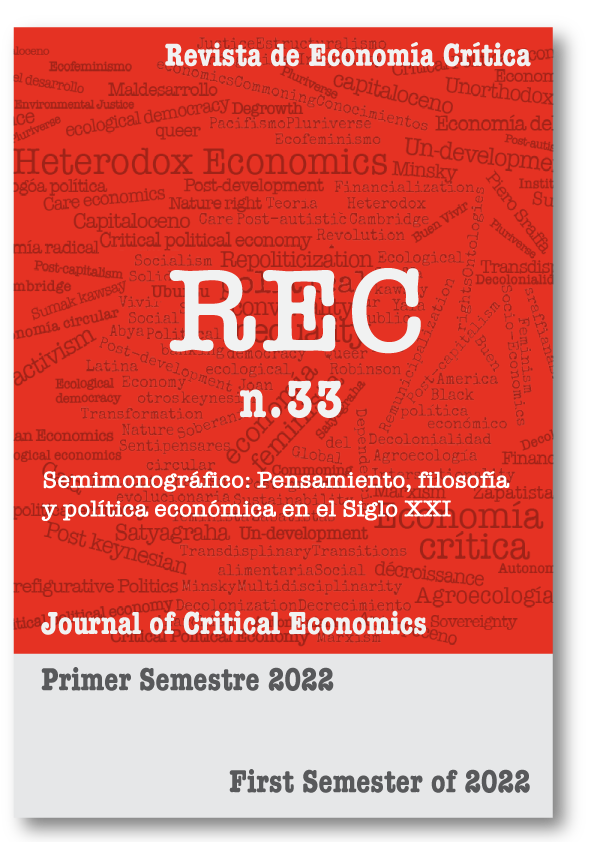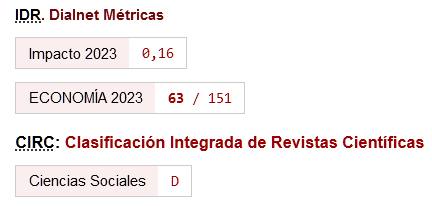Revisión y reformulación de la política monetaria para el Siglo XXI.
DOI:
https://doi.org/10.46661/rec.9021Palabras clave:
política monetaria, bancos centrales, desigualdad, cambio climático, política fiscalResumen
En un contexto caracterizado por dos graves crisis económicas casi consecutivas - la Gran Recesión y la crisis derivada de la Covid-19- y el agotamiento de la política monetaria convencional con los tipos de interés nominales situados en su límite inferior, se hace necesario reformular la actuación de los bancos centrales a través de nuevos instrumentos y objetivos multidimensionales para hacer frente a los retos a los que se enfrentan nuestras sociedades en el siglo XXI. En este marco, se integra este trabajo que pretende evaluar cómo ha evolucionado la política monetaria en los últimos años y cómo nuevos diseños de política monetaria podrían contribuir a paliar algunos de estos retos como son las elevadas desigualdades o el cambio climático. El trabajo distingue los "antiguos retos" de los "nuevos retos" a los que se enfrenta la política monetaria. También, el artículo afronta el encaje futuro de la política monetaria en la nueva política fiscal expansiva aplicada en todas las economías desarrolladas tras la crisis económica provocada por la pandemia de la COVID-19.
Descargas
Citas
Albert, Juan Francisco, Gómez-Fernández, Nerea, & Ochando, Carlos. (2019). Effects of unconventional monetary policy on income and wealth distribution: Evidence from United States and Eurozone. Panoeconomicus, 66(5), 535-558. https://doi.org/10.2298/PAN161208007M DOI: https://doi.org/10.2298/PAN161208007M
Albert, Juan Francisco, & Gómez-Fernández, Nerea. (2021). Monetary Policy and the redistribution of net worth in the U.S. Journal of Economic Policy Reform, online-first. https://doi.org/10.1080/17487870.2021.1895778 DOI: https://doi.org/10.1080/17487870.2021.1895778
Albert, Juan Francisco, Martín-Fuentes, Natalia, & Pérez-Moreno, Salvador. (2021). Política monetaria, desigualdad y crisis climática. International Review of Economic Policy- Revista Internacional de Política Económica, nº2, Vol. 3. https://doi.org/10.7203/IREP.3.2.22784 DOI: https://doi.org/10.7203/IREP.3.2.22784
Alesina, Alberto, y Lawrence Summers (1993). Central Bank Independence and Macroeconomic performance: Some Comparative Evidence. Journal of Money, Credit and Banking, 20(1), pp: 151-162. https://doi.org/10.2307/2077833 DOI: https://doi.org/10.2307/2077833
Aklin, Michael, Andreas Kern, y Mario Negre (2021). Does Central Bank Independence Increase Inequality? Working Paper World Bank, nº 9522. https://doi.org/10.1596/1813-9450-9522 DOI: https://doi.org/10.1596/1813-9450-9522
Arias, Xose Carlos (2009). La crisis de 2008 y la naturaleza de la política económica. Instituto Universitario de Análisis económico y Social. Universidad de Alcalá de Henares.
Arias, Xose Carlos, y Antón Costas (2011). La torre de la arrogancia. Políticas y mercados después de la tormenta. Ariel, Barcelona.
Arias, Xose Carlos, y José Francisco Teixeira (mayo de 2013). Políticas monetarias: una nueva agenda. XI Jornadas Internacionales de Política Económica. Bilbao.
Auclert, Adrien (2019). Monetary policy and the redistribution channel. American Economic Review, 109(6), 2333-67. https://doi.org/10.1257/aer.20160137 DOI: https://doi.org/10.1257/aer.20160137
Auclert, Adrien, y Matthew Rognlie (2018). Inequality and aggregate demand. National Bureau of Economic Research No. w24280. https://doi.org/10.3386/w24280 DOI: https://doi.org/10.3386/w24280
Barac, Maja, y Pilar Tamborero (2021). Medidas de política económica en la UE ante la crisis derivada de la COVID-19. International Review of Economic Policy-Revista Internacional de Política Económica, Vol 1 (nº1), 1-19. https://doi.org/10.7203/IREP.3.1.21246 DOI: https://doi.org/10.7203/IREP.3.1.21246
Bartholomew, Luke, y Paul Diggle (2021). Central banks and climate change-the case for action. Disponible en SSRN 3895605. https://doi.org/10.2139/ssrn.3895605 DOI: https://doi.org/10.2139/ssrn.3895605
Bartsch, Elga, Jean Boivin, Stanley Fischer, Philipp Hildebrand, y Simon Wan (2019). Dealing with the Next Downturn: From Unconventional Monetary Policy to Unprecedented Policy Coordination. SUERF Policy Note, 105, 1-16.
Baumann, Philipp, Enzo Rossi, y Michael Schomaker (2021). Central Bank Independence and Inflation: Weak Causality at Best. Disponible en: Voxeu.org. https://voxeu.org/article/central-bank-independence-and-inflation
Beckworth, David (2020). COVID-19 Pandemic, Direct Cash Transfers, and the Federal Reserve. Mercatus Center Research Paper Series, Special Edition Policy Brief. https://doi.org/10.2139/ssrn.3564453 DOI: https://doi.org/10.2139/ssrn.3564453
Bernanke, Ben S. (2015). Monetary Policy and Inequality. Brookings. Disponible en: https://www.brookings.edu/blog/ben-bernanke/2015/06/01/monetary-policy-&inequality/.
Blanchard, Olivier, Dell ́Ariccia, G., y Mauro, P. (2010). Repensar la política macroeconómica. Revista de Economía Institucional, vol 12 (22), pp: 61-82.
Blinder, Alan S. (1999). El Banco Central. Teoría y práctica. Antoni Bosch Ed.
Brunnermeier, Markus, y Landau, Jean Pierre (15 de enero de 2020). Central banks and climate change. Disponible en VoxEU.org: https://voxeu.org/article/central-banks-and-climate-change.
Carpenter, Seth B., y Rodgers William M. (2004). The disparate labor market impacts of monetary policy. Journal of Policy Analysis and Management, 23(4), 813-830. https://doi.org/10.1002/pam.20048 DOI: https://doi.org/10.1002/pam.20048
Coibion, Olivier, Gorodnichenko, Yuriy, Kueng, Lorenz, y Silvia, John (2017). Innocent Bystanders? Monetary policy and inequality. Journal of Monetary Economics, 88, 70-89. https://doi.org/10.1016/j.jmoneco.2017.05.005 DOI: https://doi.org/10.1016/j.jmoneco.2017.05.005
Colciago, Andrea, Samarina, Anna, y Haan, Jakob (2019). Central bank policies and income and wealth inequality: A survey. Journal of Economic Surveys, 33(4), 1199-1231.
https://doi.org/10.1111/joes.12314 DOI: https://doi.org/10.1111/joes.12314
Coppola, Frances (2019). The Case for People's Quantitative Easing. London: Polity Press.
Di Maggio, Marco, Kermani, Amir, Keys, Benjamin J., Piskorski, Tomasz, Ramcharan, Rodney, Seru, Amit, y Yao, Vincent (2017). Interest rate pass-through: Mortgage rates, household consumption, and voluntary deleveraging. American Economic Review, 107(11), 3550-88.
https://doi.org/10.1257/aer.20141313 DOI: https://doi.org/10.1257/aer.20141313
Dietrich, Alexander, Müller, Gernot J., y Schoenle, Raphael S. (2021). The Expectations Channel of Climate Change: Implications for Monetary Policy. CEPR Discussion Paper, 15866.
Dinan, Terry, y Diane Lim R. (2002). Distributional Effects of Carbon Allowance Trading: How Government Decisions Determine Winners and Losers. National Tax Journal, 55(2), 199-221.
https://doi.org/10.17310/ntj.2002.2.01 DOI: https://doi.org/10.17310/ntj.2002.2.01
Economides, Georgos, y Anastasios Xepapadeas (2018). Monetary policy under climate change. Cesifo Working Paper, 7021/2018. https://doi.org/10.2139/ssrn.3200266 DOI: https://doi.org/10.2139/ssrn.3200266
Faccia, Donata, Miles Parker, y Stracca, Livio (2021). Feeling the heat: extreme temperatures and price stability. ECB Working Paper. https://doi.org/10.2139/ssrn.3981219 DOI: https://doi.org/10.2139/ssrn.3981219
Fernández-Albertos, José, y Manzano, Dulce (2010). Democracia, instituciones y política económica. Una introducción a la economía política. Alianza Editorial. Madrid.
Giuliani, Diletta, Kidney, S., y Meng, A. (28 y 29 de noviembre de 2017). Recommendations for Central Banks on How to Support the Development of the Green Bond Market. Paper presented at the CEP-DNB workshop on Central Banking and Green Finance, Amsterdam.
Gray, C.L., y Valerie M. (2012). Natural disasters and population mobility in Bangladesh. Proceeding of the National Academy of Science, 109(16), 6000-6005. https://doi.org/10.1073/pnas.1115944109 DOI: https://doi.org/10.1073/pnas.1115944109
Haldone, Andy (2020). What Has Central Bank Independence Ever Done For Us. UCL Economists' Society Economics, Bank of England.
Heathcote, Jonathan, Perry, Fabrizio, y Giovanni L., Violante (2010). Unequal we stand: An empirical analysis of economic inequality in the United States 1967-2006. Review of Economic Dynamics, 13(1), 15-51. https://doi.org/10.1016/j.red.2009.10.010 DOI: https://doi.org/10.1016/j.red.2009.10.010
Hilmi, Nathalie, Djoundourian, Salpie, Shahin, Wassim, y Safa, Alain (2021). Does the ECB Policy of Quantitative Easing Impact Environmental Policy Objectives? Journal of Economic Policy Reform, 1-13. https://doi.org/10.1080/17487870.2020.1855176 DOI: https://doi.org/10.1080/17487870.2020.1855176
Honohan, Patrick (2019). Should Monetary Policy Take Inequality and Climate Change in Account? PIIE Working paper, 19-18. https://doi.org/10.2139/ssrn.3478285 DOI: https://doi.org/10.2139/ssrn.3478285
Howells, Peter, y Biefang-Frisancho, Iris (2011). Desarrollos recientes en la política monetaria. Información Comercial Española, nº 858, pp: 7-22.
Iacoviello, Matteo (2005). House prices, borrowing constraints, and monetary policy in the business cycle. American Economic Review, 95(3), 739-764. https://doi.org/10.1257/0002828054201477 DOI: https://doi.org/10.1257/0002828054201477
Jappelli, Tullio, y Pistaferri, Luigi (2010). The Consumption Response to Income Changes. Annual Review of Economics, 2, 479-506. https://doi.org/10.1146/annurev.economics.050708.142933 DOI: https://doi.org/10.1146/annurev.economics.050708.142933
Jappelli, Tullio, y Scognamiglio, Annalisa (2018). Interest rate changes, mortgages, and consumption: evidence from Italy. Economic Policy, 33(94), 183-224. https://doi.org/10.1093/epolic/eiy001 DOI: https://doi.org/10.1093/epolic/eiy001
Jourdan, Stanislas (2020). Helicopter Money as a Response to the Covid-19 Recession. Positive Money Report.
Kaplan, Greg, Moll, Benjamin, y Violante, Giovanni L. (2018). Monetary policy according to HANK. American Economic Review, 108(3), 697-743. https://doi.org/10.1257/aer.20160042 DOI: https://doi.org/10.1257/aer.20160042
Klenert, David, Mattauch, Linus, Combet, Emmanuel, Edenhofer, Ottmar, Hepburn, Cameron, Rafaty, Ryan, y Stern Nicholas (2018). Making Carbon Pricing Work for Citizens. Nature Climate Change, 8(8). https://doi.org/10.1038/s41558-018-0201-2 DOI: https://doi.org/10.1038/s41558-018-0201-2
Konradt, Maximilian, y Weder di Mauro, Beatrice (2021). Carbon Taxation and Inflation: Evidence from Canada and Europe. CEPR Discussion Paper, 16396.
Lenza, Michele, y Slačálek, Jiri (2018). How does monetary policy affect income and wealth inequality? Evidence from quantitative easing in the Euro area. ECB Working Paper, 2190, ECB European Central Bank, Frankfurt am Main. https://doi.org/10.2139/ssrn.3275976 DOI: https://doi.org/10.2139/ssrn.3275976
Löyttyniemi, Timo (8 de julio de 2021). Integrating climate change into a financial stability framework. Disponible en VoxEU.org: https://voxeu.org/article/integrating-climate-change-financial-stability-framework.
Nakajima, Makoto (2015). The redistributive consequences of monetary policy. Federal Reserve Bank of Philadelphia Business Review, 2, 9-16.
Mian, Atif, Straub, Ludwig, y Sufi, Amir (2021). Indebted demand. The Quarterly Journal of Economics, 136(4), 2243-2307. https://doi.org/10.1093/qje/qjab007 DOI: https://doi.org/10.1093/qje/qjab007
Muellbauer, John (23 de diciembre de 2014). Combatting Eurozone Deflation: QE for the People. Disponible en VoxEU.org: https://voxeu.org/article/combatting-eurozone-deflation-qe-people.
Mumtaz, Haroon, y Theophilopoulou, Angeliki (2017). The impact of monetary policy on inequality in the UK. An empirical analysis. European Economic Review, 98, 410-423.
https://doi.org/10.1016/j.euroecorev.2017.07.008 DOI: https://doi.org/10.1016/j.euroecorev.2017.07.008
Mumtaz, Haroon, y Theophilopoulou, Angeliki (2020). Monetary policy and wealth inequality over the great recession in the UK. An empirical analysis. European Economic Review, 130, 103598.
https://doi.org/10.1016/j.euroecorev.2020.103598 DOI: https://doi.org/10.1016/j.euroecorev.2020.103598
Schnabel, Isabel (2020). When Markets Fail - The Need For Collective Action Tackling Climate Change. Speech at the European Sustainable Finance Summit, Frankfurt am Main.
Schoenmaker, Dirk (2021). Greening Monetary Policy. Climate Policy, 21(4), 581-592.
https://doi.org/10.1080/14693062.2020.1868392 DOI: https://doi.org/10.1080/14693062.2020.1868392
Stiglitz, Joseph, y Stern Nicholas (2017). Report of the High-Level Commission on Carbon Prices. Banco Mundial.
Tucker, Paul (2020). Sobre la independencia del banco central. Finanzas y Desarrollo, pp: 44-47.
Williamson, Stephen D. (2008). Monetary policy and distribution. Journal of Monetary Economics, 55(6), 1038-1053. https://doi.org/10.1016/j.jmoneco.2008.07.001 DOI: https://doi.org/10.1016/j.jmoneco.2008.07.001
Zerbib, Olivier D. (2017). The Green Bond Premium. CEP-DNB Workshop on Central Banking and Green Finance, Amsterdam. https://doi.org/10.2139/ssrn.2889690 DOI: https://doi.org/10.2139/ssrn.2889690
Descargas
Publicado
Cómo citar
Número
Sección
Licencia
Derechos de autor 2022 Juan Francisco Albert, Carlos Ochando Claramunt

Esta obra está bajo una licencia internacional Creative Commons Atribución 4.0.
Esta licencia permite a terceros compartir (copiar y redistribuir el material en cualquier medio o formato) y adaptar (remezclar, transformar y crear a partir del material para cualquier finalidad, incluso comercial), siempre que se reconozca la autoría y la primera publicación en esta revista (La Revista, DOI de la obra), se proporcione un enlace a la licencia y se indique si se han realizado cambios en la obra.







